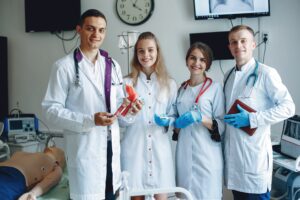After investing countless hours, energy and dedication in your Caribbean medical school, now is the time to gear up for clinical training. It is an exhilarating and intense time that offers a dramatic change in your routine. While applying the knowledge that you have acquired in your preclinical years, you will be facing a host of new challenges. The basic sciences programs are important to get to grips with the rudimentary concepts and vital terms of medicine. Clinical rotations are an entirely different story. You will learn a whole new set of skills while working with physicians, technicians, surgeons and other hospital staff. It is when you actually learn about how different clinical procedures are performed and how to create treatment plans.
So, if you are going to start your clinical rotations, here are a few things that Caribbean medical students need to keep in mind to make the most of their clinical clerkships.
- Be Prepared
Many Caribbean medical schools follow a traditional clerkship structure in which students are rotated monthly through the major disciplines of medicine such as cardiology, radiology, surgery, anesthesiology, pathology, neurology, urgent care, and a lot more. So, it is critically important that you are all set for the rotation, academically and mentally.
Remember that each discipline of medicine has its specific requirements. Prior to starting your clinical rotation, it is advised to find out the specific requirements and make sure you have enough academic material before starting your rotations. Students who have already gone through the experience can give you the best possible advice on what resources to use and how to make the most of your clinical rotations.
- Be Professional
Medical rotations are more about familiarizing medical students with the clinical environment, routine and people, as it is all about gaining hands-on experience and developing sound clinical skills. Before attending a medical school rotation, students are advised to invest in professional attire and commit to maintaining punctuality and learn how to behave professionally in clinical settings.
- Believe in Your Abilities
The ultimate goal of clinical rotations is to learn how to apply the basic science knowledge you have acquired during your preclinical years in real, clinical settings. And it is no easy feat; it needs a solid medical background and prominent level of confidence. Keep in mind that students are a vital element of the medical education process and make major contributions towards patient care. Your engagement really matters.
Clearly understand your qualities and abilities to make the most of your clinical training. Ask questions if you find things difficult. Trust me, a positive attitude, proactive approach and willingness to learn can lead you towards a positive clinical rotation experience.
- Take a Quick Visit to the Hospital
Prior to starting your clinical rotation, it is always a great idea to take a quick tour of the wards, facility, cafeteria, parking, exits in order to get familiar with the hospital layout. Taking a quick stroll to the clinic where your rotation will be taking place and introducing yourself to nurses, doctors, and other staff will definitely reduce the first-day anxiety and improve your confidence.
- Foster a Friendly Relationship
During your clinical rotations, you will be working with a variety of people including doctors, nurses, faculty staff, and patients. Creating positive and friendly relationships from day one is the key to ensuring a successful clinical experience. It will not only create a great clinical rotation experience, but also help you when it’s time for your evaluation.
- Stay Confident
Remember, this is the time when you will have the opportunity to proactively get involved in myriad disciplines of medicine and gain clinical and professional experiences. The things you will learn during this period of time will stay with you forever. So, stay confident and relaxed. Work hard, avail this opportunity to the fullest and enjoy the process.
In Closing
Clinical rotations serve as a wonderful opportunity for Caribbean medical students that allow them to learn how to actually take care of patients, create treatment plans, build relationships with patients, and eventually help you become a competent physician. Keeping the above-cited things in mind will help you survive your clinical rotations while developing your skills as a future physician. Learn as much as possible during your medical rotations, so you can carry it with you into your residency and practice.








